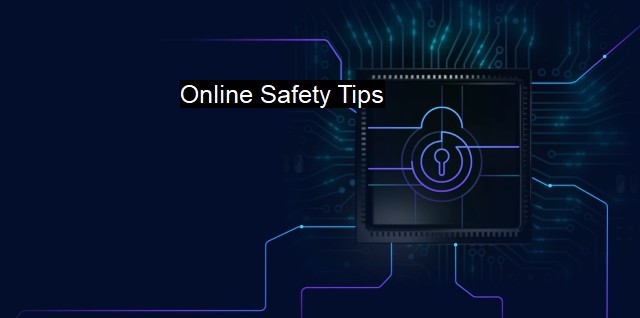What are Online Safety Tips?
Mastering Online Safety: Importance and Tips for Cybersecurity and Antivirus Protection
Understanding the concept of "Online Safety Tips" is indispensable in our digital world today. The internet brings convenience and resources to our fingertips, but with it also comes a set of risks due to cybercriminal activities. To secure your personal as well as professional life online, following online safety tips is important. Here, we capture the essence of the topic in terms of cybersecurity and antivirus protections.Online Safety Tips refers to a set of directives one should follow to maintain their private and professional information secure when accessing the internet. This includes an exhaustive variety of measures, ranging from device security to personal awareness about nefarious cyber activity like phishing and scams. To shield against such threats, online safety guidelines can be consequential.
Cybersecurity is a broad field aiming to prevent unauthorized access, disclosure, disruption, modification, inspection, recording or destruction of digital information. With ever-increasing dependence on internet-ridden technology, the relevance of cybersecurity has risen drastically. The risks vary from loss of confidentiality, integrity and availability of data, prompting the need for educating the mass about online security.
One cluster of these online security tactics is the use of Antivirus software. Antivirus is a program or collection of programs developed to prevent, search for, detect, and remove software viruses, as well as other malicious software like malware or trojans. A robust antivirus program acts as a bouncer at your computer's gate, keeping harmful elements outside and your critical data safe.
Strong and unique passwords augment the safeguards set by the antivirus. Creating a unique password for each online service used can deter cybercriminals and give you a higher level of online security. Where feasible, two-factor authentication should be enabled for an extra level of security.
Phishing attempts by cybercriminals are becoming more sophisticated. This involves deceptively obtaining sensitive information like usernames, passwords, credit card details by impersonating as trustworthy entities over emails or messages. Verifying emails you receive, particularly those asking for personal information, can ensure you are not a victim of such fraudulent activities.
Software, much like humans, is susceptible to deterioration over time. Regularly updating software and the operating system is crucial for cybersecurity. A software update often comes with security updates that shield your device from the latest known threats.
One crucial online safety tip often overlooked in the shadows of complex cybersecurity jargon is information education. Awareness about the kind of information one should not share online can play a superior role in ensuring personal security. Key information, such as banking details, social security numbers, and private emails, must not be shared over unfamiliar platforms or to unverified people.
Notably, maintaining a copy of your important files offline or in a secure cloud storage system can save a great deal of distress if a device is compromised or lost. This process, termed as backing up data, should invariably be part of your online safety measures.
Active defense tools form another component of online safety. This includes firewalls to prevent unauthorized incoming or outgoing access to a network; VPNs (Virtual Private Networks) which maintain the integrity of data transmission especially when using public Wi-Fi networks, intrusion detection systems to keep a check on any unauthorized access, and encryption tools to ensure the security of sensitive data.
Online safety tips represent a combination of everyday practices and technologies that contribute to a safer online experience. These are not just instructions to be followed but represent a mindset, a responsible behavior that each one of us must embrace in our online lives. Platforms perpetually become more complicated and the threats they pose escalate, and so does our responsibility to guarantee a safer cyberspace for all.

Online Safety Tips FAQs
What are some basic online safety tips to protect myself from cybersecurity threats?
Some basic online safety tips to protect yourself from cybersecurity threats include using strong and unique passwords, enabling two-factor authentication, avoiding suspicious links and downloads, keeping your software and antivirus up-to-date, and being cautious when sharing personal information online.How can I avoid falling for phishing scams?
To avoid falling for phishing scams, always carefully inspect the sender's email address, double-check the URL of any links you click on, don't respond to unsolicited emails or provide personal information, and consider using anti-phishing browser extensions.What should I do if my computer is infected with malware?
If your computer is infected with malware, immediately disconnect it from the internet and run a full scan using your antivirus software. If the malware cannot be removed, consider seeking professional help, restoring your system to a previous backup, or reinstalling your operating system.How can I protect my online accounts from being hacked?
To protect your online accounts from being hacked, use a strong and unique password for each account, enable two-factor authentication, be cautious when sharing personal information online, and monitor your accounts regularly for any suspicious activity. Additionally, consider using a password manager to securely store and generate strong passwords.| | A | | | B | | | C | | | D | | | E | | | F | | | G | | | H | | | I | | | J | | | K | | | L | | | M | |
| | N | | | O | | | P | | | Q | | | R | | | S | | | T | | | U | | | V | | | W | | | X | | | Y | | | Z | |
| | 1 | | | 2 | | | 3 | | | 4 | | | 7 | | | 8 | | |||||||